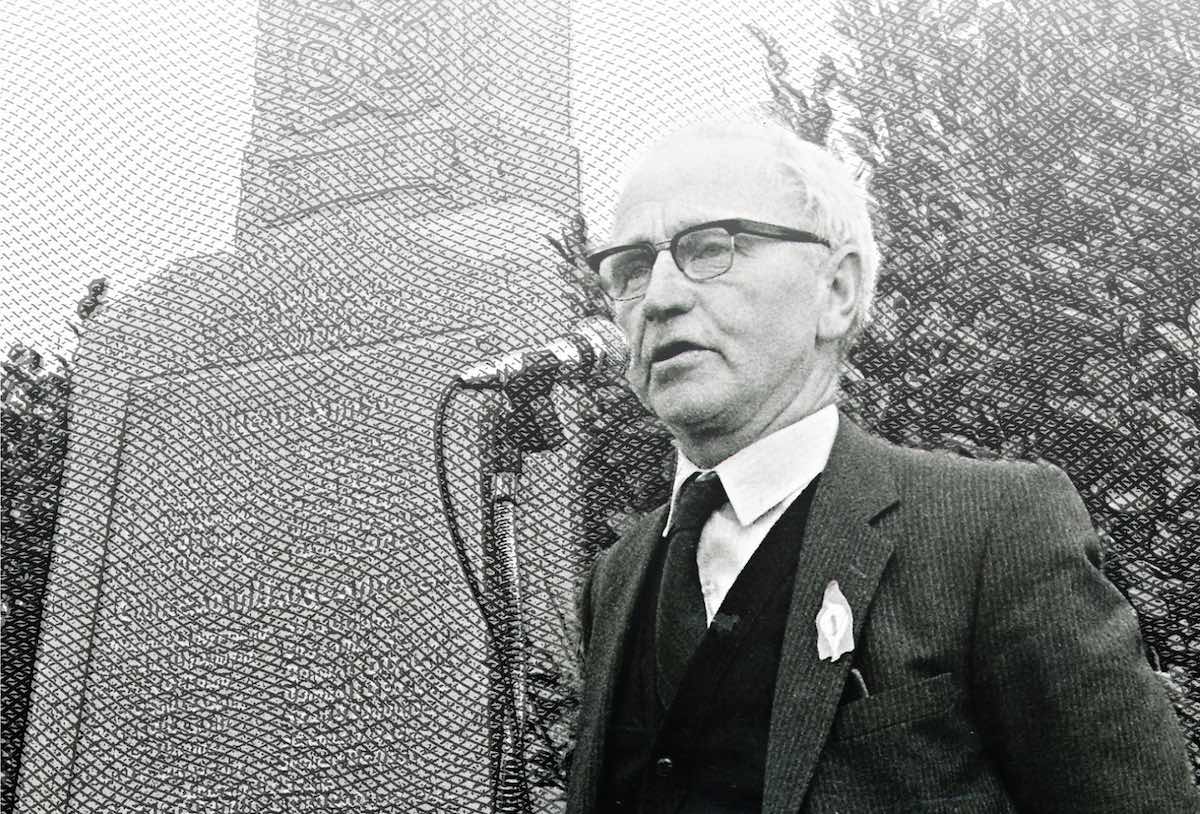
By Gerry Adams (for Leargas)
In the course of almost 60 years of activism I have been very lucky to meet many wonderful, committed, compassionate republicans. On Saturday, in Ballinamore in County Leitrim, Republicans from Leitrim and beyond gathered to celebrate the life of one of these – John Joe McGirl.
The annual John Joe McGirl commemoration is one of the highlights of the Ballinamore Festival Week and the participants walked from John McGahern Square to the monument to John Joe opposite Amharclann an Oileáin (the Island Theatre). The monument was designed by Robert Ballagh.
For many of my generation John Joe was an inspiration – a legend. I first met him in the late 1960s. I was in my late teens. I had travelled by bus from Belfast to Enniskillen one Friday evening and then hitch-hiked to Ballinamore. I slept in a field in my trusty sleeping bag and I landed in Ballinamore on a Saturday morning.
John Joe brought me to Sliabh an Iarainn, to Lough Allen and to Drumshambo. The coal miners in Arigna were on strike and we attended one of their meetings. John Joe was deeply committed to transforming the lives of ordinary citizens burdened by poverty and deprivation; and his concern for rural Ireland, and for the tens of thousands forced to emigrate, helped to shape my own politics.
He connected the national and the local – a lesson I have never forgotten. Before anyone else he understood the importance of the restoration of our inland waterways. He was a champion of education and a great suppkrter of libraries. He was also a strong gaeilgeoir. And like me a faithful and hopeful supporter of our respective country teams.
I also met Bridie, John Joe’s wife. They had married in 1951 and had five children Liam, Áine, Cait, Feargal and Nuala. Given the frequency of John Joe’s periods in prison Bridie did a great job of rearing the children.
As well as being Vice President of Sinn Féin, a former POW and a TD and a republican activist for decades, John Joe also had a long connection with Belfast. He had the distinction of being in two different prisons when both were set on fire by Republican POWs. The first time was in the notorious Curragh in December 1940 where he was savagely beaten. The second time was Long Kesh in 1974. John Joe had travelled to Belfast at Easter 1974 to give the Easter Commemoration speech. The Brits thought he was Seamus Twomey and he was arrested. When they discovered their mistake John Joe was sent to the internee end of the Long Kesh camp.
When he arrived all us internees thought – poor oul John Joe – we all felt so sorry for him. But there was no sadness or despair in John Joe. He had been down this road so many times before. Later in October that year the republican POWs burned Long Kesh to the ground. There was a fierce series of running battles through the night and the following morning in different parts of the camp between the Republican POWs and the British Army. In the midst of this John Joe was hit in the face by a rubber bullet. If my recollection is right his jaw was fractured. As flames licked around the watch-towers I made my way to John Joe and asked how he was. His response – “I’m alright as long as you people are alright”.
Speaking later about his time in Long Kesh John Joe said:“I spent nine months there…I saw young men fight hand to hand with British soldiers. I know what it means to be kicked, beaten, gassed, made to sleep in a blanket under a sheet of iron in the month of October. I was glad to join this new generation in writing their chapter in the fight for independence. I am proud to say of them – that no generation has produced braver or better”.
John Joe’s entire adult life was a reflection of the years of republican struggle through the 1930s, 40’s, 50’s, 60’s, 70’s and 80’s. Five decades of selfless commitment to the struggle for Irish freedom and independence. He was the ‘unbreakable Fenian’, the ‘gentle soldier’.
During the 1981 hunger strike John Joe travelled the length and breadth of the state rallying support for the hunger strikers. In the June 1981 general election Ciaran Doherty and Paddy Agnew were elected as TDs. Joe McDonnell came close to taking a seat in Sligo Leitrim. Despite the risk of arrest John Joe attended his funeral in Belfast. He gave the oration at Joe’s graveside in Milltown. He said: “Joe McDonnell died rather than debase the cause he served, rather than live with the forced tag of criminality on him… We will build Joe McDonnell a memorial… that will be the freedom and the unity of the Irish people.”
In 1986 John Joe seconded the motion calling for an end to the abstentionist policy towards Leinster House. As a former abstentionist TD it was a big decision for him to take. It was for him a necessary step if, in his words, “we are not going to hand down this struggle to another generation”.
Martin McGuinness like me loved John Joe. In a tribute to him Martin described John Joe as a “progressive thinker, always prepared to consider, support and propose new ways for the Republican Movement to advance. He wasn’t prepared to stand still or hold to old outdated tactics which were incapable of developing the struggle on all fronts… He was an extraordinary man, an inspiration to everyone who knew him. We treasure his memory”.
![[Irish Republican News]](https://republican-news.org/graphics/title_gifs/rn.gif)
![[Irish Republican News]](https://republican-news.org/graphics/title_gifs/harp.gif)

